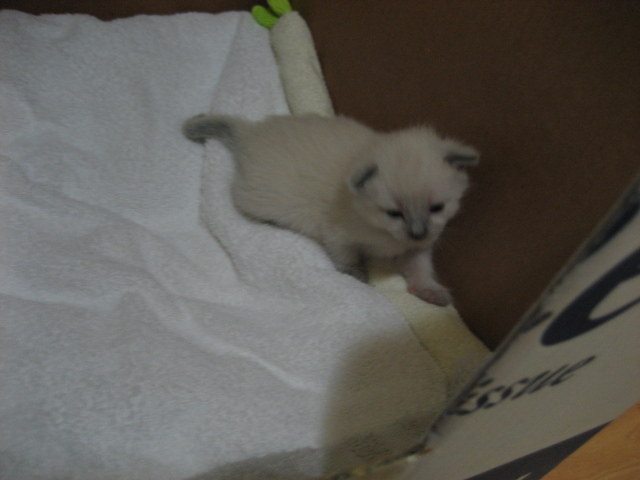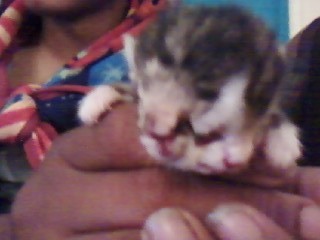QuestionMy family was adopted by a mixed breed female kitten 10 years ago. She is an outdoors/indoors cat with a calm personality. She has had 2 litters in her life.
About a year and half ago we were adopted by a second kitten who loves the older cat. The love is not returned.
Now the younger cat has given birth to 3 healthy kittens. (This cat got pregnant the last week of January 09 with over 12 inches of snow on the ground!!!) The older cat cried very loud the night the kittens were born and has never looked at them since.
Now the kittens are 3 weeks old approx. I showed the kittens to the older cat and she hissed at them. Would she kill the kittens?
AnswerPatrick,
While it wouldn't be common for a female cat to kill kittens it's a possibility that she may be inclined to injure or kill them since she's been showing aggression towards them. It's better for mom and her babies if you isolate her from the other pets in your household by keeping her in a room set up as a nursery with food, water, toys, litter boxes and a cardboard box lined with old towels or blankets. Kittens are born with very little resistance to viral or bacterial infections which may not affect older cats so keeping them away from cats other than their mother is best for them until they've been vaccinated and make sure that everyone who handles them washes their hands thoroughly with hot soapy water beforehand. In feral cat colonies it's quite common for related female cats to raise kittens together, however this isn't the case in your situation your two cats live together, but they haven't spent their lives together as siblings or a mother-daughter type relationship. In this case these two girls have a complicated relationship, it's best to either opt out of introducing the kittens into the household or follow my recommendations for proper new cat/kitten introductions once they've been vaccinated if you intend to make a lifetime commitment to these little guys.
The kittens should be close to potty training at this point so it's a good idea to consider making a kitten sized litter box available so that their mother can teach them how to use it along with your help. The best way to teach a kitten to use the litter box is to gently place them into the box after they've woken from a nap, eaten, had a drink or have been playing for awhile. Once they're in the box you will need to gently use one or both of their front paws to dig a hole in the litter, then it's a matter of patient persistence while you stand by to return the kitten to the litter pan each time s/he leaves it until s/he has made a deposit, then you can teach him/her how to cover the deposit although this is usually quite instinctive.
Another important point to bring to your attention is that mother cats don't require any help to wean their kittens, they will normally do so on their own during the first 12 weeks of life - just because you don't see the kittens nursing frequently doesn't mean that they aren't doing so. Kittens should really stay with their mother and siblings for a minimum of 12 weeks to allow them to learn how to be a cat and understand basics like bite inhibition, grooming, hunting, stalking and killing of prey as well as things like using a scratch post, defending themselves and learning that human hands and feet aren't toys. Kittens taken from their mother younger than 10-12 weeks of age have a higher likelihood of developing behavioral issues like biting or using their sharp claws on people rather than toys and scratch posts. Mother cats are excellent parents, they discipline their kittens from birth and try to help them become good pets when they've been socialized with people. It's very important for the future adoptability of the kittens to have people of different genders, ages and races handle the kittens if at all possible so that they are comfortable with as many different people as possible - after all social kittens tend to be more adoptable than those who haven't been properly socialized.
Female cats can become pregnant very shortly after giving birth so it's best to keep mom indoors and away from any intact male cats to avoid further accidents. There is a serious pet overpopulation crisis affecting shelters and rescue groups worldwide. Every single day animal lovers working for these organizations are forced to euthanize healthy, adoptable animals because there just isn't enough time, space or resources to keep all animals indefinitely while waiting for their forever families to come along. Spaying and neutering pets is an ethical choice that saves countless lives worldwide every year. Contrary to popular belief female cats don't need to have a litter of kittens in order to calm down enough to be good house pets. There are many good medical and behavioral reasons to spay and neuter cats. Cats that have been spayed or neutered are prevented from developing uterine, ovarian or testicular cancer. The earlier in life that a cat is spayed or neutered the lower their risk is of developing breast or prostate cancer. Unspayed female cats are also at risk of developing a potentially fatal uterine infection called pyometra - this infection causes the uterus to fill with pus, if the womb ruptures spreading pus throughout the abdomen the chances of the cat surviving are pretty slim. The only treatment for pyometra is to perform an emergency spay, this surgery is riskier than a routine spay because the cat is quite sick, the spay is also much more complex so it takes more time and is usually far more expensive. In North American cats the leading cause of death is euthanasia related to behavioral problems, this is a sad and easily changed statistic because many behavioral problems are preventable or significantly reduced by spaying or neutering our cats at a young age. Cats that have been spayed or neutered are far less likely to develop common behavioral issues like urinating or defecating outside of the litter box or home to mark their territory, they're also far less likely to be fighting with other neighborhood cats in an effort to protect their territory (medical expenses from treating abscesses and bite wounds caused by fighting can add up rather quickly). A female cat that has been spayed won't howl to advertise her availability to mate, a male cat that's been neutered won't caterwaul late at night in an effort to win the right to mate with a receptive female cat. Spaying and neutering also reduces some forms of aggression that are directed at human caregivers. All in all ensuring that the cats you care for are spayed and neutered provides them with a less stressful life, they aren't consumed with mating and defending territory and many serious medical problems are prevented or the likelihood that they will occur is significantly reduced. Simply put spaying and neutering saves lives, it's the responsible and ethical choice to ensure that our pets live longer, healthier and happier lives.

 Cat keeps biting neck of new kitten
Question
my babys
Hiya I have adopted a new kitten (fem
Cat keeps biting neck of new kitten
Question
my babys
Hiya I have adopted a new kitten (fem
 is my kitten blue or blue cream point?
Question
polar bear
hi Jessica, our mommy cat is a blac
is my kitten blue or blue cream point?
Question
polar bear
hi Jessica, our mommy cat is a blac
 albinism
Question
Cat
Hello! I was wondering if you could
albinism
Question
Cat
Hello! I was wondering if you could
 my cat had a kitten with one head and part of another with a mouth and has not nursed since she was born.
Question
my newborn kitten
my cat delivered a female ki
my cat had a kitten with one head and part of another with a mouth and has not nursed since she was born.
Question
my newborn kitten
my cat delivered a female ki
 Recently Adopted Cat
Question
CREAM PUFF
Hello !
Hoping all is well.
Recently Adopted Cat
Question
CREAM PUFF
Hello !
Hoping all is well.